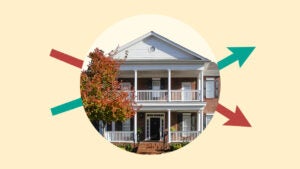Are high prices keeping you from homeownership? Consider a condo

Key takeaways
- Condo prices are typically much lower than single-family home prices, offering first-time buyers hope in today’s challenging housing market.
- The lower price point allows buyers to begin building equity now, rather than continuing to rent until they can afford a single-family home.
- However, condos comes with downsides as well, including strict rules, less privacy, additional fees and increased lender scrutiny.
According to Bankrate’s Homeowner Regrets Survey, more than 3 in 4 (78 percent) of U.S. adults said that owning a home was part of the American Dream. That’s far more than other life milestones, such as having children (45 percent) or getting a college degree (35 percent). In today’s housing market, however, it’s much harder to make that dream a reality. An imbalance of supply and demand has pushed home prices to record highs, while rates for 30-year mortgages continue to linger near the 7 percent mark.
But does that mean you have to abandon your dream of homeownership? Not necessarily. You can get yourself on the real estate ladder for less by shifting your search from single-family homes to condos. Read on to learn more about how to buy a condo, and whether it can help you overcome home affordability challenges.
What is a condo?
Let’s start with the basics. Short for condominium, a condo is a single unit within a multiple-unit property. It can be one of many units in a shared structure, like a high-rise building, or it can be in a much smaller building with just two or three units.
Buying a condo is typically cheaper than buying a single-family home, which makes it an appealing option for first-time buyers and helps you start building home equity sooner. “With a condo, you typically have a lower cost of entry and lower maintenance costs,” says Mark Hamrick, senior economic analyst at Bankrate. “You’re also typically located in a fairly dense urban setting with easy access to more amenities and mass transportation.”
With a condo, you typically have a lower cost of entry and lower maintenance costs.— Mark Hamrick, Bankrate Senior Economic Analyst
Anyone who’s thinking about buying a home should understand what the purchase includes. With a condo, no matter how big the building or property is, you own your individual unit. You also enjoy access to common areas and shared amenities, which might include pools, playgrounds, fitness centers and other public spaces. (There is typically a monthly fee that covers the maintenance of these areas; more on that later.) Condo owners also pay for their own property taxes and utilities.
Shared areas of condos are usually managed by a condo association, which is a type of homeowners association or HOA. It typically acts as a supervisory board and hires a property management company to handle maintenance, communication with residents and other duties. Some may impose additional fees to cover shared expenses, such as unexpected building repairs.
Why buying a condo is cheaper than a house
One of the key points of differentiation between a condo and a house is price: Condos are typically cheaper. The median price for an existing condo or co-op was $359,800 as of November 2024, according to data from the National Association of Realtors — a sizable savings versus $410,900 for a typical single-family home.
However, the saying “you get what you pay for” rings true here. When buying a condo, you own only the interior space of your specific dwelling unit. The land and other facilities are owned in common with the other owners of the complex. Condos also generally come with less space: You may not have your own backyard, for example, and the overall square footage tends to be smaller than a single-family home.
In addition, while house owners are relatively free to make changes to suit their personal needs and tastes, condo owners may face restrictions when it comes to remodeling. For example, “if the owner of a single-family home needs to replace the windows, they have the discretion over when to do it and what kind of windows to buy,” Hamrick says. “With a condo, it’s generally up to the governing body.”
It’s important to take the cost of the condo association’s monthly fees into consideration when you budget for your home purchase as well. These fees might not be set in stone: “Like property taxes, there is some risk associated with HOA fees increasing over time or with large, one-time special assessments,” Hamrick says.
Still, some of these tradeoffs can be worth it: Homeowners needed an annual salary of $110,871 to afford a median-priced home of $402,343, according to Bankrate’s Home Affordability Study. Since the median price of a condo can be significantly lower than a single-family home, someone on a five-figure income may still be able to afford to buy. For example, Redfin data shows that the typical condo in Phoenix sold for $300,000 in November 2024 — that’s more than $175,000 cheaper than a median-priced single-family home there.
8 expert condo-buying tips
1. Consider your lifestyle
Condo living means greater home affordability, with less effort and expense for home maintenance. So if you want to save money and don’t want to deal with lawn care or snow shoveling, a condo might be for you. However, if the desire for a large backyard outweighs the time you’ll need to spend maintaining it — or if sharing walls with a neighbor seems unappealing — a condo might not be your best option.
2. Find a Realtor who knows the condo landscape
Find a local real estate agent who understands the ins and outs of the condo-buying process — ideally, someone with a proven condo track record in your specific area. Agents who are plugged into the local condo scene know whether particular buildings have had past financial troubles or community issues. In addition, an experienced agent will be able to address any concerns you might have and guide you through the process.
3. Understand the nuances of condo mortgages
It’s also smart to seek out a mortgage professional with condo experience, so you can secure the right financing for your purchase. Condo loans can be a bit trickier than a typical single-family home loan, even if you have an excellent credit score, as the lender will want to scrutinize the finances of the condo development as well as your own personal finances. And if you’re looking to use an FHA mortgage, browse the listing of Federal Housing Administration approved condos online to make sure the properties you’re looking at are eligible.
4. Think about what amenities you want
Some condos might simply cover basic upkeep of the common areas, while others can offer perks like a gym, pools, outdoor barbecue areas and other luxury amenities. When looking at condos, think about the amenities you really want and will actually use. You’re buying access to these when you buy your unit, and more amenities usually means higher fees, so be mindful of how they’ll affect your budget — and whether you’ll be paying for things you’ll never take advantage of.
5. Review association fees, rules and financial reserves
Look into the condo association fees and exactly what’s covered by them. Ask how often — and by how much — the fees increase each year, too. It’s also a good idea to ask about the community’s house rules. Are there any noise restrictions, or rules about booking common areas in advance? Understanding these ahead of time will help you figure out whether the community you’re looking at is really a good fit for you. Finally, ask for copies of at least the three previous years’ financial reports, and make sure your lawyer or accountant reviews them to ensure the community’s finances are sound. Reserve funds are especially important if the building is older, since age often comes with more need for upkeep.
6. Ask about special assessments
Special assessments are extra charges the condo association may impose to fund a significant project. An assessment is usually voted on by the board, if not all of the community’s residents. They are usually imposed for a limited amount of time, but they’re a good thing to be aware of because they’ll affect your budget while they’re in place. If the association is planning to replace the building’s elevators in the coming year, for example, you might be able to use this as a bargaining chip with the seller.
7. Research the property management company
Understanding who will be in charge of doing the upkeep for the property is crucial. It can be frustrating to pay monthly dues only to have the amenities fall into disrepair, and poor management can potentially affect your property’s value or push your dues even higher. When touring condos, ask who is in charge of maintaining the day-to-day operations. You can direct questions such as who handles resident requests and community rules to the property management company itself.
8. Plan ahead for the big picture
There can be less home price appreciation with a condo — if you want to make a substantial gain in wealth, it may take more time.— Mark Hamrick, Bankrate Senior Economic Analyst
While a condo can make an ideal starter home, you may outgrow a one- or two-bedroom unit sooner than you think. One of the big benefits of owning a home is the chance to cash in when you’re ready to move — but keep in mind that condo values may not increase as much over time as houses do. “There can be less home price appreciation with a condo,” Hamrick says. “If you want to make a substantial gain in wealth, it may take more time.” However, if you can afford to hold on to the condo after you move out, you might also be able to earn a steady rental income. Be sure to research the building’s rules regarding renters to know whether it’s permitted.
Pros and cons of buying a condo
If home affordability challenges have you considering a condo, here are some top factors to think about:
Pros
- Lower price: Condos usually have much lower entry price points than freestanding homes, and property taxes tend to be lower, too.
- Less maintenance: Condos require less attention than single-family homes, with less responsibility for upkeep since the HOA handles much of the work.
- Socializing opportunities: Some condo associations organize social events for residents, like barbecues and holiday parties, which can be great if you’re young or new to town and don’t know many people yet.
- Amenities: Many communities offer access to top-notch amenities like a grilling area, fitness center, pool, dog park, clubhouse and more.
Cons
- Rules and restrictions: Condo rules can be restrictive, regulating everything from how many pets you can have to what items may be stored on your patio.
- Fees: In addition to your monthly mortgage payment, there will likely be a monthly fee to cover amenities, maintenance, insurance and reserves, which tend to increase over time.
- Investment risk: If a fellow condo owner goes into foreclosure and their unit changes hands at a steep discount, for example, that will affect everyone’s property values.
- Less privacy: You may be sharing walls, ceilings and floors with adjoining owners, so noise can potentially be an issue.
FAQs
Why we ask for feedback Your feedback helps us improve our content and services. It takes less than a minute to complete.
Your responses are anonymous and will only be used for improving our website.
You may also like


Can you afford to buy a home? Can anyone?




